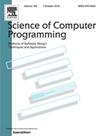异构多服务器系统中时间敏感应用程序的利润感知调度
IF 1.4
4区 计算机科学
Q3 COMPUTER SCIENCE, SOFTWARE ENGINEERING
引用次数: 0
摘要
网络物理系统(CPS)的不断发展,特别是由物联网(IoT)支持的网络物理系统(CPS),导致了大量数据的产生,以及对智能、实时决策的需求不断增长。在这样的系统中,高效的基于软件的任务调度对于确保及时响应、最佳资源利用和持续的服务质量(QoS)至关重要。异构多服务器架构通过支持并行处理和自适应工作负载分配,提供了一个很有前途的平台。然而,计算节点固有的异构性,加上时间敏感应用程序严格的时间要求,对软件级调度机制提出了实质性的挑战。为了解决这些挑战,本文介绍了一种专门为包含多个输入队列和异构服务器的CPS环境设计的利润感知和自适应调度算法。该算法利用贪婪启发式和基于效用的任务建模方法,根据当前系统状态和任务期限动态分配资源。在截止日期内完成的任务对系统利润有积极的贡献,而延迟的任务则会受到惩罚或被拒绝。大量的仿真实验表明,该算法显著提高了系统的响应能力,提高了系统的整体利用率。在对基线和完善的调度策略(包括随机、轮循、MaxWeight和MaxWeight与折扣ucb)的比较评估中,所提出的方法实现了平均响应时间减少30%,总利润增加31%,截止日期满意率提高50%。这些结果突出了所提出的软件级调度方法在时间敏感环境下提高CPS运行效率的有效性。本文章由计算机程序翻译,如有差异,请以英文原文为准。
Profit-aware scheduling for time-sensitive applications in heterogeneous multi-server systems
The continuous evolution of Cyber-Physical Systems (CPS), particularly those empowered by the Internet of Things (IoT), has led to the generation of massive volumes of data and a growing demand for intelligent, real-time decision-making. Within such systems, efficient software-based task scheduling is vital to ensure timely responsiveness, optimal resource utilization, and sustained Quality of Service (QoS). Heterogeneous multi-server architectures offer a promising platform by enabling parallel processing and adaptive workload distribution. However, the inherent heterogeneity of computational nodes, coupled with the stringent temporal requirements of time-sensitive applications, imposes substantial challenges on software-level scheduling mechanisms. To address these challenges, this paper introduces a profit-aware and adaptive scheduling algorithm specifically designed for CPS environments comprising multiple input queues and heterogeneous servers. The proposed algorithm utilizes a greedy heuristic and a utility-based task modeling approach to dynamically allocate resources in accordance with current system state and task deadlines. Tasks that are completed within their deadline thresholds contribute positively to system profit, whereas delayed tasks incur penalties or are rejected. Extensive simulation experiments demonstrate that the proposed algorithm significantly enhances system responsiveness and improves overall system utility. In comparative evaluations against baseline and well-established scheduling strategies—including Random, Round Robin, MaxWeight, and MaxWeight with Discounted UCB—the proposed method achieves up to 30% reduction in average response time, 31% increase in total profit, and 50% improvement in deadline satisfaction rate. These results highlight the effectiveness of the proposed software-level scheduling approach in enhancing the operational efficiency of CPS in time-sensitive contexts.
求助全文
通过发布文献求助,成功后即可免费获取论文全文。
去求助
来源期刊

Science of Computer Programming
工程技术-计算机:软件工程
CiteScore
3.80
自引率
0.00%
发文量
76
审稿时长
67 days
期刊介绍:
Science of Computer Programming is dedicated to the distribution of research results in the areas of software systems development, use and maintenance, including the software aspects of hardware design.
The journal has a wide scope ranging from the many facets of methodological foundations to the details of technical issues andthe aspects of industrial practice.
The subjects of interest to SCP cover the entire spectrum of methods for the entire life cycle of software systems, including
• Requirements, specification, design, validation, verification, coding, testing, maintenance, metrics and renovation of software;
• Design, implementation and evaluation of programming languages;
• Programming environments, development tools, visualisation and animation;
• Management of the development process;
• Human factors in software, software for social interaction, software for social computing;
• Cyber physical systems, and software for the interaction between the physical and the machine;
• Software aspects of infrastructure services, system administration, and network management.
 求助内容:
求助内容: 应助结果提醒方式:
应助结果提醒方式:


